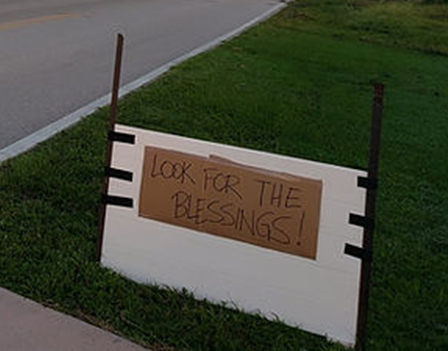Faith in Marriage
- myhighplaces22
- Jun 30, 2023
- 5 min read
Updated: Jul 7, 2023
By Carol Mithers
Is a common spiritual bond critical to marital health and happiness?

When Liz Hammer began dating her husband, Brian, at 21, in so me ways it was an improbable pairing. Liz was bubbly and outgoing, Brian quiet and reserved. At a party she was apt to work the room while he sat off to the side, deep in a one-on-one conversation. In one major way, though, they were very much alike. Both had been raised in religious homes where belief in God was the bedrock of their lives. Both had gone to a Christian college, where they'd met. Both had known that they would marry someone equally devout. "My relationship with Christ was so much a part of who I was, there was no way I could be married and not share it," says Liz, now 43. Eighteen years of marriage and four children later, faith remains the foundation of the bond between Brian, a litigation consultant, and Liz, a stay-at-home mother in Santa Monica, California. It is, she says, "the springboard from which we make all our choices and decisions."
Faith -- belief in the judgment and authority of a higher power -- can have a powerful positive influence on the marital bond, research has shown. David Popenoe, PhD, professor of sociology at Rutgers University, in New Brunswick, New Jersey, and codirector of the National Marriage Project, sees being "answerable to a higher authority" as "vital" for a strong marriage. In part, faith has this power because belief in God often also means a belief that marriage itself is sacred. The conviction that, as Liz Hammer puts it, "this is a commitment we made before God, so divorce isn't an option" can give couples both emotional security and an incentive to keep their relationship strong.
"There's never the anxiety that we'll have a deal-breaking argument," says Hammer.
"And if we're frustrated, we know that we have to work it out."
The idea that religious conviction helps a couple navigate rough spots is echoed by others. "There are times when I lose patience with my husband and feel free to be short with him," says Beverly, a 37-year-old mother of three in New York City and an Orthodox Jew. "But on Yom Kippur [the Jewish Day of Atonement], I ask his forgiveness for those times. Having to say 'I'm sorry' -- and to admit that I haven't been as good a wife as I'd like to be -- requires me to swallow my ego. These moments force us to have a very different kind of conversation than we would have if we were just going out to dinner."
In addition, faith helps hold couples together by encouraging selflessness and stressing the need to give as much as one takes. "We know that for love to last, it must evolve from romantic love, which is the basis for many marriages, into something more mature and less selfish," says Gary L. Hansen, PhD, professor of sociology at the University of Kentucky, in Lexington. "Faith may help couples make that transition." The result: unions that not only are enduring but satisfying. One survey of 161 men and women published in 2003 in the Journal for the Scientific Study of Religion found that inner religious commitment coupled with church attendance was associated with a reduced tendency to engage in extramarital affairs, or "mate poaching."
One Marriage, Two Faiths
Religion, however, can complicate marriage when spouses hold different beliefs. Today, according to a recent American Religious Identification Survey by the Graduate Center at City University of New York, 22 percent of U.S. households are of mixed faiths (Christian/non-Christian, Christian of different denominations, or believer/nonbeliever). Some 50 percent of Jews and 25 percent of Catholics marry outside their faith, and 16 percent of Americans switch their religious affiliation at some point.
Religious beliefs not only influence our most basic convictions -- what happens after we die, what it means to live a virtuous life -- they also govern a host of daily choices, such as what to eat, how to raise children, even whether or not to use birth control. And "every layer of difference that exists between partners adds complexity to a marriage," says Joel Crohn, PhD, the San Rafael, California-based author of Mixed Matches (Ballantine, 1995). An additional difficulty, says Dr. Crohn, is that before marriage many interfaith couples never discuss what their religion means to them and how the difference will affect their future. Do they intend to go to their respective churches alone or attend alternate churches together? Will they want their child baptized? Celebrate a first communion or bar mitzvah? Such unresolved issues can become emotional minefields. One unfortunate result: Adults who've had children with someone of another faith have a divorce rate three times that of single-faith households. Indeed, disputes over what faith to instill in the children can outlast the marriage. Experts say battles over "soul custody," as it has been called, are on the rise. (The courts have been slow to get involved because many judges believe determining a child's religion is outside their purview.)
The greatest predictor of marital stability, however, isn't whether a couple is of the same faith but how much they agree on the role religion will play in their lives.
Denominational differences don't cause breakups, according to a study at Creighton University's Center for Marriage and Family, in Omaha, Nebraska. It depends on what the couple do together religiously and how they deal with differences. If they can fashion some kind of shared religious life, they will be as stable as any same-church marriage, concludes the study.
Growing numbers of interfaith couples, with the help of support organizations, networks, therapists, and even clergy, are successfully fashioning marriages that incorporate faith, whether that means one partner converting, each remaining with his or her religion of origin, or both embracing a new, blended belief.
Eve Edwards, 34, of McLean, Virginia, found such a compromise. An observant Jew, she had always wanted to share her beliefs with the Roman Catholic college sweetheart she married at 25. Neither spouse ever considered giving up his or her religion. Instead, after much discussion and soul searching the couple chose to raise their children in both faiths.
"We celebrate Easter and Passover, Christmas and Hanukkah," says Edwards. "We tell our children, 'Mommy's Jewish and Daddy's Catholic, and you are Jewish and Catholic.' We tell them that different people envision God differently and different people take different paths. But in the end all paths lead to God." Edwards acknowledges that their family life would have been simpler had she and her husband agreed on one faith from the outset. But the process of deciding how to practice their faiths and what to teach their children, she says, "has given us one more way to share."
For more stories from Our High Places website - click here
To join Our High Places Facebook - click here




Comments